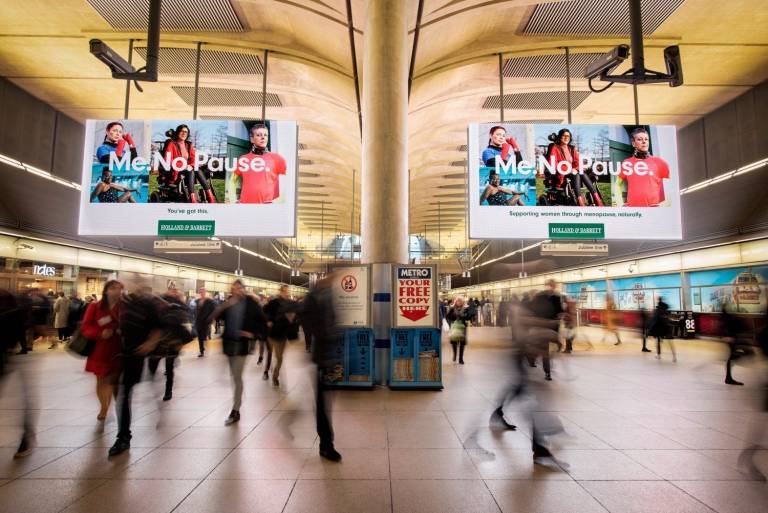Winner of London advertising campaign announced following IOE research on the city’s adverts
28 January 2019
City Hall and Transport for London (TfL) have announced the winner of the ‘Women We See’ campaign that was launched following UCL Institute of Education (IOE) research that found a significant proportion of Londoners feel ignored and unrepresented by the city’s adverts.

Holland & Barrett’s ‘Me.No.Pause’ campaign won the competition which was designed to make advertising in London more representative of the capital.
IOE research had previously found that fewer than one in three Londoners feel that adverts in the city are relevant to them
The research, conducted by IOE academic Professor Jessica Ringrose and Dr Kaitlyn Regehr (University of Kent), found that less than half (48%) of Londoners felt that advertisements adequately reflected the diversity of the city, although three in four (75%) respondents thought that advertisements in London should reflect the diversity of the city’s population.
The majority (71%) of black Londoners felt that they were not well represented and 61% of British Asians felt there was an under-representation of Asian communities.
Just 18% of participants could recall ever seeing an advert featuring a disabled person, and the majority of men and women said they did not see enough images of disabled people. Those surveyed from the LGBTQ+ community also felt excluded, with just one in three feeling their sexual orientation was well represented.
‘Sexualisation of women’ was the top answer given as to why respondents disliked adverts, with 68% of Londoners saying that women are often shown in revealing clothes when it’s not relevant. Those that felt least represented were women over the age of 55, with 55% of women over 55 saying that they felt ‘fairly badly’ or ‘very badly’ represented. Less than one in four respondents could recall seeing an advert featuring someone with wrinkles.
Linda (65), a participant in the report, said:
“Do we judge men by their faces? When men get grey that’s debonair, that’s sexy, look at George Clooney, he’s grey now but he’s still sexy. You know, but if his wife decided to go grey? It’s very sad isn’t it […] for me when you get to a certain age you become invisible.”
‘Me.No.Pause’ was commended by the judging panel for its positive presentation of women going through the menopause and commitment to reflecting the diversity of women in London. The campaign has been awarded with £500,000-worth of prominent advertising space across the TfL network as a prize.
Professor Ringrose said: “We are thrilled that the winner has responded directly to our research findings and showcased a wider diversity of women and age. In our study, we found that the rich diversity of London was one of the participant’s favourite aspect of the city, but Londoners wanted advertisements to feature diverse, representations of age, but also race, culture, religion, sexuality, ability, size and shape. For instance, the fact that 51% of women felt their body shape was not represented and 50% of women said we see too many slim people in London advertising presents an enormous challenge.”
Dr Kaitlyn Regehr said: “We remain hopeful that creatives, brands and advertisers will continue to respond to our important findings and to press for further changes in London’s advertising.”
Media contact
Rowan Walker, UCL Media Relations
T: +44 (0) 20 3108 8515 / +44 (0) 7769 141006
E: rowan.walker@ucl.ac.uk
Links
- Londoners feel ignored and not represented by adverts
- View Professor Jessica Ringrose's research profile
- Department of Education, Practice and Society
- Centre for Sociology of Education and Equity
 Close
Close

